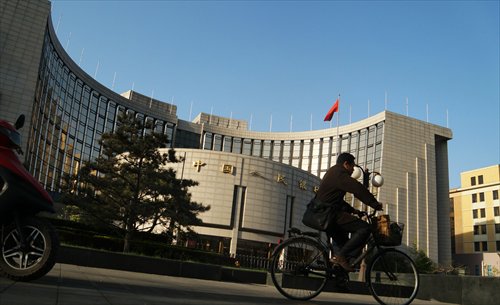HOME >> BUSINESS
Yuan’s slide past 7 versus dollar doesn’t mean much: analysts
By Zhang Hongpei Source:Global Times Published: 2019/6/11 20:38:40

A cyclist rides past the headquarters of the People's Bank of China, China's central bank, in Beijing. File photo: IC
It is likely that the Chinese currency will slide past 7 against the US dollar, the psychological red line, but that's not what is most important. It is the yuan's stability that matters, Chinese analysts told the Global Times on Tuesday.
The nation has "tremendous" room to adjust its fiscal and monetary toolkit if trade tensions worsen, and no number is more important than other numbers for the yuan's exchange rate, said Yi Gang, governor of the People's Bank of China (PBC), the country's central bank, during a recent interview with Bloomberg. Yi's comments were widely interpreted by the market as a sign that the path is open for the yuan to slide past 7.
"I think no red line actually exists. There is no genuine difference if it is very near 7 or just past 7," said Dong Dengxin, director of the Finance and Securities Institute at the Wuhan University of Science and Technology.
Dong told the Global Times on Tuesday that in the short term, the central bank has its target for adjusting the rate in a bid to prevent wild volatility, but in the long run, the PBC is not worried about the exchange rate nor will it interfere with the currency's trend. As the yuan is becoming more internationalized, its exchange rate mechanism is also market-driven, said Dong.
As far as Dong is concerned, the level of 7 per US dollar isn't the sticking point. But the currency will steadily fluctuate, which is very significant for international investors and assets.
A recent Reuters poll showed "a slight increase in the number of forecasters who thought that the 7 mark might yet be crossed" as the China-US trade war escalates.
"Of 31 currency strategists in the June poll who answered an additional question, about half said the yuan will not breach the 7 per dollar rate any time soon. But 12 said it would happen in the next 12 months, including one who said within a month," Reuters reported.
The central parity rate of the yuan weakened 5 basis points to 6.8930 against the greenback on Tuesday, according to the China Foreign Exchange Trade System. In the country's spot foreign exchange market, the yuan can rise or fall by 2 percent from the daily fixing each trading day.
PBC said in a statement on its website on Tuesday that it will sell yuan-denominated bills in Hong Kong in late June in a bid to improve the yuan bond yield curve in Hong Kong.
The announcement boosted the offshore yuan by more than 260 basis points within an hour.
Posted in: MARKETS